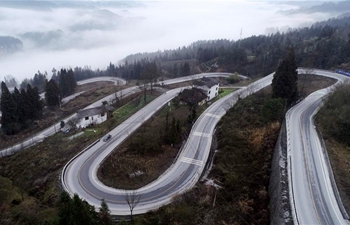by Keren Setton
JERUSALEM, March 9 (Xinhua) -- If there is beauty in death, it can be found in the Dead Sea, which is now lowering at an alarming level.
The Israeli government is in an attempt to preserve and save the lowest place on earth as booming tourism.
The Dead Sea attracts about 70 percent of tourists to Israel, making it a top destination in the country.
The commercial centers, malls and aging hotels are now under improvement with new infrastructure.
Israel also has a massive plan to build 17 new hotels along the coastline. Tractors are working, new sewage pipes are being laid and the paradox of a dying natural wonder with a flourishing tourism scene is stunning.
The Dead Sea, which used to be one continuous body, is now dotted with small salt islands spread across it. It is a stark visual reminder of how quickly it is drying up.
The coastline has also gone farther and farther inwards compared to where the sea used to be. There are stranded lifeguard posts where water once used to be, but is no more.
The salt formations that have been exposed as water levels decrease portray beauty in what is otherwise a sad situation.
"The Dead Sea loses the equivalent of 600 Olympic swimming pools every day, 750 million cubic inches of water a year," said Jake Ben Zaken, who operates the only commercial boat allowed into the Dead Sea.
According to Ben Zaken and other experts, the main problem is that not enough water is coming into this unique body of water. Chemical companies in both Israel and Jordan, which share the Dead Sea, are depleting it for their works.
"The bright side is that since it's man made, it's fixable," he added.
The sharp decrease began in recent decades and is also a result of policies undertaken by both countries. Facing a continuous lack of water, they needed to divert water that would normally arrive at the Dead Sea. This decision was critical to the fate of the body of water.
Mineral beach, which used to be a popular beach along the world's saltiest body of water, is adjacent to the Kibbutz of Mizpe Shalem.
It is now abandoned, parts gapped with life-threatening sinkholes after being closed abruptly in 2015, which was a loss of livelihood for many of the Kibbutz members.
There are an estimated 6,000 sinkholes in the area, according to the Israeli Ministry of Environmental Protection.
The sinkholes occur when fresh water coming from Jerusalem and the West Bank arrive at the Dead Sea and cause the underground layers of salt to dissolve.
On the shores of the Dead Sea, brown steps serve as another illustration of the speed at which the body of water is drying up.
"The Dead Sea is not an ecological disaster yet, but we are in a demographic disaster that people are leaving," Ben Zaken said, adding that "we have become a graveyard."
The abandoned lifeguard hut in Mineral Beach and the crocked palm trees, half sunken into the ground, are a sharp contrast to the construction boom just a few kilometers away.
The hotels and spas in the area must now transport their guests to the beaches by car or small trains as the water has gone farther in. Ben Zaken also needs to transport his boat by vehicle to the water.
Realizing to revive the area for worldwide tourists, the Israeli government formed the Dead Sea Preservation Government Company (DSPG) and has invested millions of U.S. dollars in the project.
Beaches have been upgraded, a new mall has been erected and there has been intense work to improve the infrastructure in the area.
"Our strategic plan here is to make a high standard well-being resort area," said Nir Kedmi, chief financial officer for DSPG.
"Before we made the plans, we made extensive research about environmental issues. No stone here was left without taking care," Kedmi added.
In the beginning of February, the first Dead Sea marathon with over 2,000 participants was held, which was another effort to raise awareness. Runners ran along a strip of land crossing the Dead Sea where water once flowed.
"The sea here is drying and has changed its shape," said Daniel Keren, an Israeli athlete and marathon consultant. "It's like an animal that is being eaten alive."
The push from the government may help people who lost their livelihood from the sinkhole disaster. As more tourists come, there will be more motivation to preserve and save the Dead Sea.

















